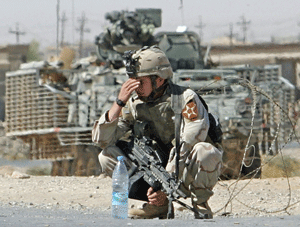September 11th raised new questions about what constitutes a just war, especially in an age of terrorism. If U.S. leaders knew about the attacks on Sept. 10, would they be justified in taking lethal action? In the aftermath of 9/11 critics complained that just-war principles restricted the options open to policy makers and military planners. As Drew Christiansen wrote in 2003:
After Sept. 11, moralists of the permissive school—as I call them for their willingness to justify most government policies—reasoned that the war on terror warranted disregard of what they termed the “limiting principles” among the ad bellum rules, norms like last resort and proportionality, in favor of the “legitimating” ones, like just cause and proper authority.
As the United States prepared to invade Iraq, the Vatican reiterated its commitment to the just war tradition and voiced its opposition to the idea of launching war to preempt attack.
From the point of view of Catholic just-war teaching, preventive war is a dangerous innovation. If the distinction between aggression and defensive war is blurred, then the world is threatened with a war of all against all. In Rome, Cardinal Joseph Ratzinger, prefect of the Congregation for the Doctrine of the Faith, dismissed the notion. Preventive war, he said, “does not appear in the Catechism of the Catholic Church.”








